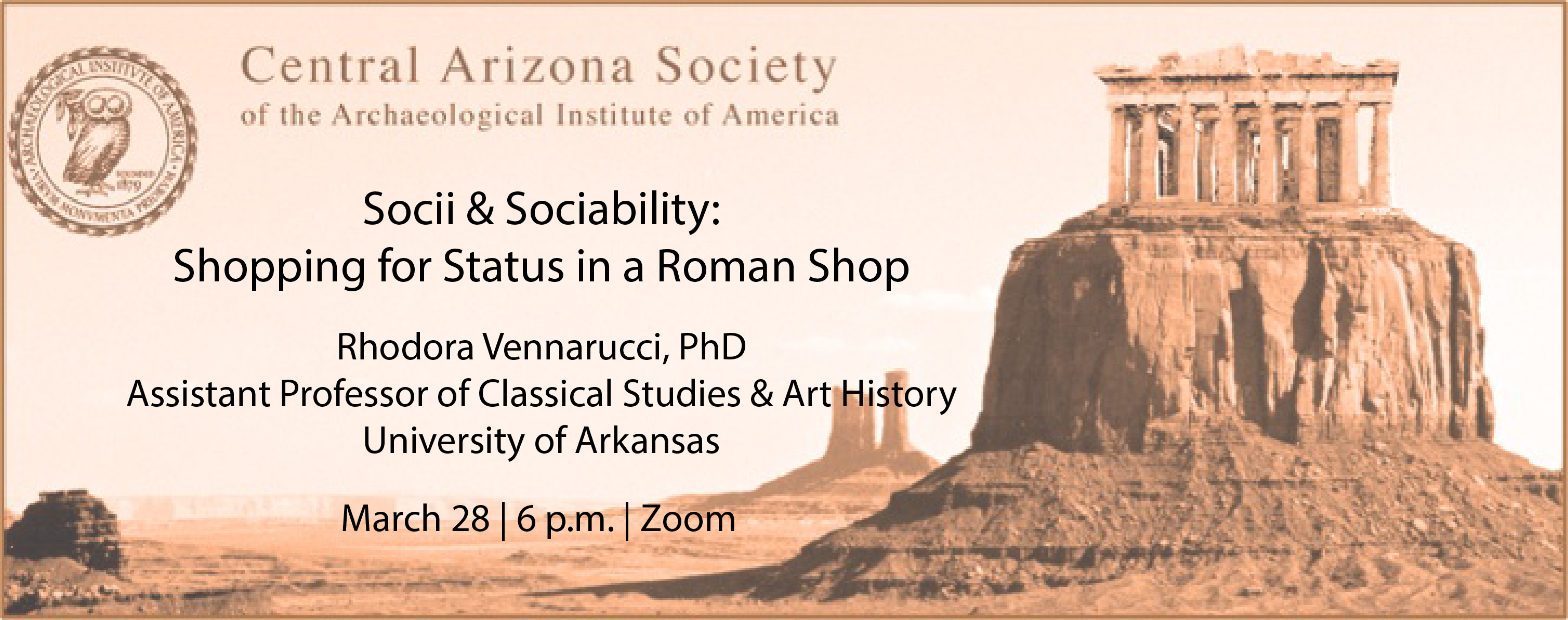
This is an online event.
Sponsored by: Archaeological Institute of America
Work in Consumer Culture Theory (CCT) has underscored that shopping is meaningful behavior. It is still new, however, to ask how shopping behavior was meaningful for people in the Roman world in part because consumption studies in archaeology have overlooked consumer agency and the social act of consumption. This talk applies a CCT and phenomenological approach to The Felt Shop of Verecundus (IX.7.5-7) from Pompeii, which sold fine footwear (e.g. socci, soft-soled felted slippers) and high-status textile products (e.g. toga praetexta) to explore how ancient consumers self-fashioned through public acts of consumption in the shop. An interactive 3D model of the shop in VR, reconstructed using the architectural remains and archival data from the shop’s excavation, facilitated this investigation, which contributes to the Virtual Roman Retail project.
Socci were a luxury item worn indoors and at dinner parties that only the more affluent in society could afford. Shopping for slippers then on the via dell’Abondanza, Pompeii’s most heavily trafficked thoroughfare, was a social act that involved the public performance of (aspirational?) power and status displayed for a larger and more diverse street audience than a private triclinium, where the slippers were ultimately meant to be worn, could offer. This lecture discusses how shopping behavior, traditionally viewed as a component of modern retailing, conveyed sociocultural meaning in Roman society and highlights the social and communicative functions of the Roman shop, alongside its commercial and distributive functions.

Socii & Sociability: Shopping for Status in a Roman Shop
Matson Lecture
Rhodora Vennarucci, PhD
Assistant Professor of Classical Studies & Art History
University of Arkansas
Work in Consumer Culture Theory (CCT) has underscored that shopping is meaningful behavior. It is still new, however, to ask how shopping behavior was meaningful for people in the Roman world in part because consumption studies in archaeology have overlooked consumer agency and the social act of consumption. This talk applies a CCT and phenomenological approach to The Felt Shop of Verecundus (IX.7.5-7) from Pompeii, which sold fine footwear (e.g. socci, soft-soled felted slippers) and high-status textile products (e.g. toga praetexta) to explore how ancient consumers self-fashioned through public acts of consumption in the shop. An interactive 3D model of the shop in VR, reconstructed using the architectural remains and archival data from the shop’s excavation, facilitated this investigation, which contributes to the Virtual Roman Retail project.
Socci were a luxury item worn indoors and at dinner parties that only the more affluent in society could afford. Shopping for slippers then on the via dell’Abondanza, Pompeii’s most heavily trafficked thoroughfare, was a social act that involved the public performance of (aspirational?) power and status displayed for a larger and more diverse street audience than a private triclinium, where the slippers were ultimately meant to be worn, could offer. This lecture discusses how shopping behavior, traditionally viewed as a common.
Register via Zoom